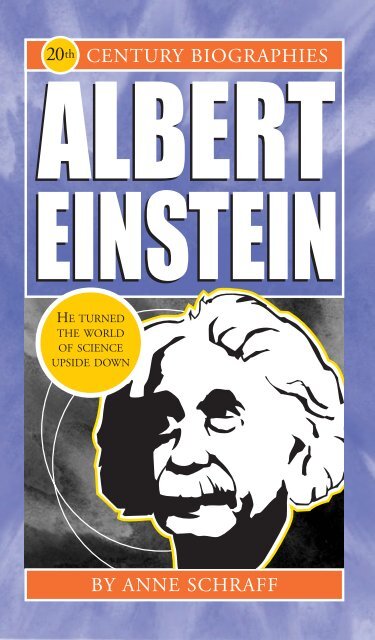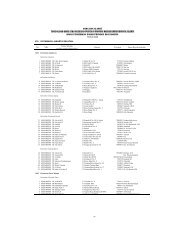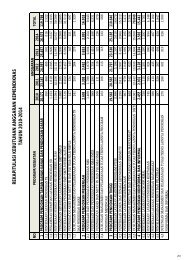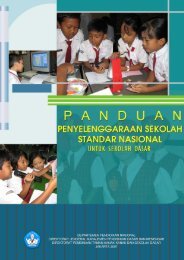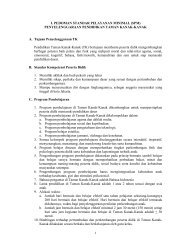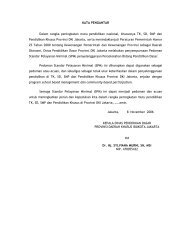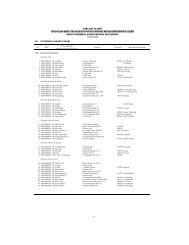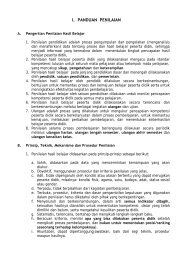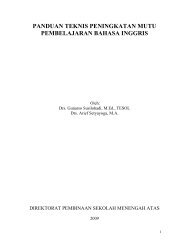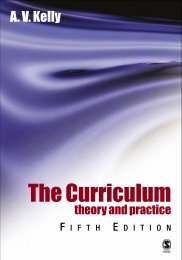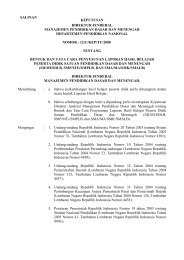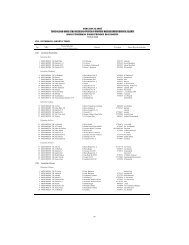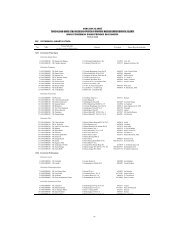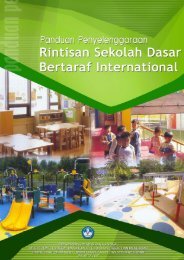BY ANNE SCHRAFF 20th CENTURY BIOGRAPHIES IES
BY ANNE SCHRAFF 20th CENTURY BIOGRAPHIES IES
BY ANNE SCHRAFF 20th CENTURY BIOGRAPHIES IES
- No tags were found...
You also want an ePaper? Increase the reach of your titles
YUMPU automatically turns print PDFs into web optimized ePapers that Google loves.
ALBERTEINSTEIN<strong>BY</strong> <strong>ANNE</strong> <strong>SCHRAFF</strong>
Development: Kent Publishing Services, Inc.Design and Production: Signature Design Group, Inc.SADDLEBACK EDUCATIONAL PUBLISHINGThree WatsonIrvine, CA 92618-2767Web site: www.sdlback.comPhoto Credits: pages 8, 42, 45, 61, Zuma Press;page 24, KPA Photo ArchiveCopyright © 2008 by Saddleback Educational Publishing.All rights reserved. No part of this book may be reproducedin any form or by any means, electronic or mechanical,including photocopying, recording, or any informationstorage and retrieval system, without the written permissionof the publisher.ISBN-10: 1-59905-246-6ISBN-13: 978-1-59905-246-5eBook: 978-1-60291-607-4Printed in the United States of America1 2 3 4 5 6 10 09 08 07
eligious practices. For example, theydid not go to the synagogue or followdietary laws.Albert was the Einstein’s first child.Pauline thought her baby son’s head wasan unusual shape. She worried that hemight have mental problems. Her worryonly increased when Albert was slow tolearn to speak.In 1880 the Einsteins moved toMunich, the capital of Bavaria and acenter of industry. Albert’s father hopedhe’d have better luck there. In 1881Albert’s sister, Maja, was born. It was ahappy home. The parents showeredtheir two children with love.Grandparents, aunts, and uncles allinterested in their well-beingsurrounded the children. Still, Albertwas very quiet. Even at nine, he onlyspoke slowly and thoughtfully.7
When Albert was very young, hisfather gave him a magnetic compass.The little boy was delighted andcaptivated by the compass. He keptstudying it and turning it around andaround. Albert also enjoyed doingjigsaw puzzles and building very highhouses of cards. He liked to read, but henever chose light, funny books. Healways wanted serious books that hecould learn from.As a young child, Albert was tutored athome. He had a very hot temper. Oneday, when he was frustrated, he pickedup a chair and threw it at his tutor. Theangry teacher fled, never to return.Albert learned to control his temperafter that.One day, Albert’s parents took him tosee a military parade. They thought hewould enjoy seeing the marching9
soldiers and hearing the music. ButAlbert wept at the sight of the soldiersmarching close together. They lookedlike a frightening monster with manyarms and legs to the little boy. All hislife, Albert would dislike the military.Albert’s mother was a talented pianistwho passed on her love of music to herchildren. Albert loved to listen to hismother playing the piano.Finally, it was time for Albert to attendregular school. His parents wanted topick the best school they could find fortheir son. The nearest good school was aCatholic school. It had a fine academicrecord. The Einsteins did not care whatreligion was taught at the school. Theyonly wanted their son to get a goodeducation.10
Albert Einstein enjoyed hearing thecolorful Bible stories at the Catholicschool. He was the only Jewish child inthe whole school, but that was not aproblem. The problem was that Albertjust did not like school. He thought ithad been better before with a tutor andhis parents teaching him at home.11
C H A P T E R2Albert did not like the discipline ofthe classroom. He did not want to sit inone place. He did not want to do as hewas told. He was rebellious andtroublesome. He hated having tomemorize. Albert preferred being alone,so he avoided the other children. Healso disliked sports. He did not take partin any of the games.12
Even though seven-year-old Albert didnot like school, he worked hard. Hisreport cards were excellent. But Albertalways believed he learned the reallyimportant things at home. For example,his Uncle Jakob introduced him toalgebra. He loved it from the beginning.Whenever the boy had some free time,he studied mathematics on his own.Albert also learned to play the violin athome. His love of music grew.When he was ten years old, Albert wassent to Luitpold School, a secondaryschool. Again, he was very unhappy. Heknew a lot more than the other studentsabout mathematics and science. He wasnot popular with the other students.Albert began teaching himself physicsand higher mathematics while studyingthe regular subjects at Luitpold.13
To young Albert, school felt like thearmy. The teachers were like officers. Hewas told that he had to be likeeverybody else. He begged his father tomove the family out of Germany.Albert Einstein believed in pacifistideals from a young age. He worriedthat he might be drafted into theGerman army. He believed that allconflicts between nations could besettled by peaceful compromise. Hethought war was barbaric.In 1894 when Albert was fifteen, hisfather failed in business again. Albert’sfather got a new job in Italy. The familypacked up and left Germany. They tooktheir daughter, Maja, with them. SinceAlbert had not yet graduated from highschool, he was left behind. Albert wascrushed. He had to live in a boardinghouse. He was miserable without hisfamily.14
After six months, Albert quit schooland joined his family in Italy. Hisparents were upset that their son had leftschool without earning his high schooldiploma. It was impossible to entermost colleges without a high schooldiploma.Albert loved Italy. He went to artgalleries. He learned to sail. He climbedmountains. He listened to music. Buthis parents wanted him to earn a livingin electrical engineering. He needed auniversity degree. Few universitiesenrolled students without their highschool diploma. But his parents foundone that required only that students passan entrance test. It was called the SwissFederal Polytechnic Institute. Albertscored well in math but didn’t pass thegeneral knowledge test.15
The Institute sent Albert to school fora year in Aarau, a nearby town. There heprepared for the exam. Albert enjoyedschool in Switzerland. He loved the landand the people. He felt free to study. Hedid not just have to memorize dates andfacts. He took the test again, and thistime he passed.16
C H A P T E R3Einstein planned to teach math andphysics in high school. He began a fouryearcourse at the Institute. He likedcollege better than high school. But hewas still not a good student. He oftencut classes. And he argued with histeachers when he disagreed with them.Einstein enjoyed walking in the hillsaround the school. He liked to eat hismeals in restaurants. In the evenings, heplayed music. Einstein and his friendseach played an instrument. They would17
gather at someone’s home or in a littlecoffee shop. Einstein played the violinand a young female student from Serbia,Mileva Maric, played the piano.Young Albert took notice of the darkhaired, dark-eyed Maric, and theybecame friends. But even though heenjoyed his friends, Einstein was mostinterested in self-study. He wasconstantly wondering about the rules ofphysics and trying to work out problemsthat interested him. When he and hisfriends went on sailboat rides, everyonerelaxed. But Einstein wrote mathproblems and solutions on a notepad.His mind was always busy.Einstein became a close friend ofanother student, Marcel Grossman.Einstein and Grossman and otherfriends spent hours discussingmathematical problems.18
Although Einstein was recognized atthe Institute as brilliant and gifted, hewas unpopular with the professors. Hewas stubborn. He refused to listen tothem and give them the respect they feltthey deserved. In August 1900 Einsteingraduated. Now twenty-one, he neededa job badly. He was living on anallowance from home, and his familywas far from rich. Hermann Einsteinnever found a good enough position togive his family a worry free life. AlbertEinstein wanted to be on his own andnot add to the financial burdens of hisfamily.Einstein wrote letters to differentschools asking for a position teachingmathematics. Since he had not madefriends with his professors at theInstitute, there were no helping handsreaching out to him. On his jobapplications, Einstein wrote that he had19
already published scientific articles inthe German Annals of Physics. But aftersearching for a year he still had no job.He earned some money tutoringstudents in math and science. He tookpart time positions teaching when theregular teachers were ill. But he had noreal job and no decent income.In 1901 Albert Einstein became acitizen of Switzerland. He submitted apaper he had written to the Universityof Zurich in the hopes of getting hisPh.D. Such a degree would haveincreased his chances of finding work.His paper was rejected. Einstein wasbeginning to feel that the world wasagainst him.Down to his last few cents, Einsteingot a long-term substitute teaching jobat Winterthur, 17 miles north ofZurich. He taught mathematics to boys20
who were not interested at first. ButEinstein discovered that he was able togain their attention and teach themsomething. But that job ended and soonEinstein was so poor that he was cuttingback on his meals and losing weight. Hegot another job tutoring boys, but hewas fired when his employer disagreedwith his methods.Albert Einstein had almost given uphope of finding a good job. In 1902his friend, Marcel Grossman, came tohis rescue.21
C H A P T E R4With the help of his friend, MarcelGrossman, Albert Einstein got a job inBern, Switzerland, at the patent office asa third class examiner. His job was to bepart of a technical team looking at newinventions and deciding if they deserveda patent. A patent is a documentcertifying that the invention workedand was original. Einstein loved to workwith new inventions. He was like a childagain, staring with wonder at thatcompass his father gave him. Einstein's22
skill and enthusiasm soon got himpromoted to second class technicalexpert.Mileva Maric was a physicist likeAlbert Einstein. She too had big dreamsfor her profession. She enjoyeddiscussing scientific theories withEinstein. She was intelligent enough tounderstand him. Originally fromGreece with Serbian roots, she grew upin Hungary. Four years older thanEinstein, she was bright, energetic, andquick. But Albert Einstein wanted awife, not a partner in his work. Heasked Maric to marry him. They weremarried in January 1903.The young couple rented anapartment with a view of the Alps.Einstein was pondering the nature oflight, concluding that it was made up ofindividual particles of energy, which he23
called photons. The scientific world atthe time thought light was transmittedin waves.Albert Einstein with his wife, Mileva Maric.24
The Einstein’s first son, Hans Albert,was born on May 14, 1904. Einsteinwas very happy as a father. He oftenwheeled his infant son down the streetin a baby carriage. He even tried to helphis wife with the household chores.Mileva Einstein was a perfectionist.Soon, she was taking care of the babyand the house while Einstein waswriting scientific articles and thinkingabout atoms and molecules. At thetime, no one knew for sure if atoms andmolecules even existed.Atoms and molecules are the smallestparticles in nature. They are ofteninvisible, even under a microscope.Einstein wanted to prove that theseinvisible particles behaved just likelarger, visible particles. He noticed thatlarger particles moved around when in aliquid. He thought they were being hit25
y smaller, invisible particles. The onlyway to prove his theory was throughmathematics.The motion of particles was calledBrownian Motion. Einstein publishedan article, “On the Movement of SmallParticles,” in 1905. He proved theexistence of molecules and their motion.For this discovery, Albert Einstein wasawarded a Doctor of Philosophy degreefrom the University of Zurich.1905 was an incredible year forEinstein. It came to be called a“Wonderful Year.” He published anumber of research papers that changedscience forever. While working full timeat the patent office, he producedrevolutionary theories about space,matter, and time.Einstein turned his attention to thestudy of light. The speed of light had26
een verified as 186,000 miles a second.Now Einstein concluded that the speedof light in free space was the only fixedthing in the universe. Everything else isrelative. This was called his “Theory ofRelativity.”According to Einstein, time is variable.For example, if someone walked besidea man bouncing a ball, the path of theball would look straight up and down.But if you stood still, and the manwalked past you bouncing the ball, theball would appear to move diagonallyup and down. So it would seem as if theball went a longer distance in the sameamount of time. The idea of time andspace, then, depended on the observerand where he was.Another example is a sailor raising aflag on a ship. To the sailor standing atthe base of the flagpole, the flag moves27
straight up. But to an observer on shore,the flag moves forward and up at thesame time. Time and space are relative.They depend on the observer’s frame ofreference.Einstein published his article onspecial relativity in the Annals of Physics.When other scientists read it, some wereupset. They thought this twenty-sixyear-oldupstart was tampering withIsaac Newton’s fixed laws. Others,however, knew Einstein’s insights wereimportant. They increased ourunderstanding of the universe.28
C H A P T E R5Albert Einstein then began to thinkabout energy and matter. Einstein saidthey are different forms of the samething. His idea was that if matter movedfast enough, it became energy. If energywas slowed down, it became matter. Heintroduced a mathematical equation toprove this theory: E = mc 2 . “E” standsfor energy, “m” stands for mass, and “c 2 ”stands for the speed of light multipliedby itself. The equation says that there isa huge amount of energy tied up in even29
a small amount of matter. For the firsttime, someone explained how the suncould go on giving off light for billionsof years without cooling off.Albert Einstein came up with theseamazing ideas when he was still a clerkat the patent office. His friends told himthat with his knowledge, he should be auniversity professor. But Einstein fearedhaving teaching responsibilities. Hethought teaching would take too muchtime from his research.Einstein was receiving invitations tolecture at universities. Mileva Einsteinwas hoping for a better career for herhusband. Einstein enjoyed work at thepatent office. But he wondered if hewould always be happy looking at newinventions.30
In 1909 Albert Einstein became aprofessor of physics at the University ofZurich. Albert and Mileva Einstein fellin love with Zurich. It was a happy timefor the family. Albert Einstein enjoyedplaying games and telling stories to hisfive-year-old son. Albert and Milevaoften attended the opera and thetheatre. On July 28, 1910, the Einstein’ssecond son was born. Eduard was giventhe pet nickname of “Tete.” Unlike therobust Hans, Eduard was a frail child.With the birth of a second child,Mileva Einstein believed the familyneeded more money. Einstein addedmore lectures. He began thinking aboutthe problems of gravity. In 1911Einstein was offered a higher salary toteach at the University of Prague. Soon,Albert Einstein’s fame spread. He was31
invited to meetings with world famousscientists. Then Einstein was offeredthree jobs, director of physics at theprestigious Kaiser Wilhelm Institute,membership in the Prussian Academy ofScience, and professor at the Universityof Berlin.News that the family might be movingto Germany made Mileva Einstein veryunhappy. Einstein accepted the newjobs. Mileva Einstein and her two sonscontinued to live in Switzerland. Themarriage was over. She had beenunhappy for a long time because herown career as a physicist neverdeveloped. She was frustrated with herhusband’s personality.Mileva Einstein began a new life as adivorcée and single mother with twoyoung boys. Albert Einstein supportedhis family financially. He made regular32
trips to Switzerland to see his sons. Buthe was very lonely living alone in Berlin.To relieve his loneliness, Einstein oftenvisited his Uncle Rudolf who lived inBerlin. Rudolf Einstein’s daughter, Elsa,lived there as well with her twodaughters, Margot and Ilse. AlbertEinstein and Elsa Einstein were cousins.They had often played together aschildren. He felt very comfortable withher. He liked the two girls, too. WhenAlbert played the violin and Elsa playedthe piano, the girls were charmed.Einstein found he liked living inBerlin. The people were friendlier thanhe expected. He spent much of his timestudying gravity. He also spent pleasanthours with Elsa and her daughters. LikeEinstein, Elsa was also divorced. Shescolded Albert for not taking better careof himself. He seemed much too thin.33
Unlike Mileva, Elsa was not a brilliantwoman. She was simple, kind, anddown to earth. Little by little, shebecame an important part of AlbertEinstein’s life.But another dark cloud was loomingover the life of Einstein and all ofEurope. In 1914 it appeared that theworld would soon be going to war.34
C H A P T E R6Albert Einstein hated war. He was apacifist. He joined with other scientistsin pleading with Europeans to start aleague dedicated to peace. Einsteinbegan to promote peace, tolerance, andjustice. He was horrified by the thoughtof Europe being torn apart by war. Butby the end of the summer of 1914, fullscalewar raged. Injuries and deathmounted on both sides. Einstein saw itas senseless evil.35
Einstein still worked on his new ideasabout space, matter, and time. Hewanted to show how gravity fit with hisideas. After eight years of work, heconcluded that gravity was the productof space distorted by the presence ofmatter. In 1916 Einstein published hisideas as the “General Theory ofRelativity.” This has been called hismost important achievement.Einstein said that a beam of lightwould be bent by gravity as it passed astar. The gravity of the star would causethe light beam to curve. In 1919Einstein”s theory was tested. Britishastronomers photographed stars duringa total eclipse of the sun. Thephotographs were compared withpictures of the same stars when the sunwas far off. The different positions ofthe stars on the two differentphotographs proved that the sundeflects starlight.36
Einstein’s general theory of relativityhelped explain such things as the curvedshape of the universe. It also explainedwhy the universe is expanding, whatblack holes are, and the “big bang”theory of how the universe began.In 1919 five months after his divorceto Mileva Einstein was final, AlbertEinstein married Elsa EinsteinLowenthal. Einstein legally adoptedElsa’s two daughters. He enjoyed themimmensely. Once again, AlbertEinstein had a happy home. But hecontinued to work hard. Elsa tenderlycared for him when he was sick.Einstein spent a lot of time readingphilosophy and listening to music. Heworked to discover what is called aunified field theory. Einstein sought todiscover a single law that explains howall natural forces work.37
Einstein continued to see his sons. In1920 he met fifteen-year-old Hans inItaly. They hiked for several days andEinstein shared fatherly advice.In 1920 Albert Einstein was thesubject of much publicity andadmiration. But in Germany, his workwas sometimes criticized. Anti-semitismwas a terrible problem in Germany.After the end of World War I, it flaredwith increased energy. Some Germans,embittered by the fact that they lostWorld War I, blamed the Jews. Theyalso blamed the Jews for terribleunemployment and inflation inGermany. Einstein’s theories wereridiculed as “Jewish physics.”In Germany, there was a small groupof angry Germans promoting the ideathat only pure “Aryan” Germans wereworthy human beings. All non-Aryans,38
especially Jews, were belittled. Theleader of this violent movement was aformer house painter named AdolfHitler. At that time, hardly anyonesuspected the role Hitler would play inthe future. But Einstein and otherthoughtful men were disgusted andalarmed.39
C H A P T E R7In 1921 Chaim Weizmann, achemistry professor and leader of theZionist movement asked for Einstein’shelp in establishing Hebrew Universityin Palestine. The Zionists wanted tocreate a homeland for Jewish people.Einstein accompanied Weizmann on atrip to the United States. The Einsteinsarrived in New York in April. Reporterscrowded about to interview him.40
Albert Einstein was invited to the WhiteHouse to meet President FranklinRoosevelt. The family was greeted whereverthey went with warmth and good will.Columbia University gave him amedal and offered him a job. Einsteinraised millions of dollars for HebrewUniversity.Einstein gave a series of lectures atPrinceton University. His lectures onthe theory of relativity were delivered inGerman. An American professor thengave the same lecture in English. Thelectures were published in a book, TheMeaning of Relativity. Princeton gavehim an honorary degree.After the U.S. trip, Einstein traveledthe world. He met with scientists andgave lectures. During a trip to Japan, helearned that he won the Nobel Prize inphysics.41
42Einstein demonstrates his formulas on ablackboard during a lecture.
He was also awarded membership intoall of the leading scientific academies.Meanwhile, trouble was brewing inGermany. The Nazi Party was gaining inpopularity. Even as his fame wasgrowing around the world, Einstein’sbelief in peace and a unified Europe wasnot popular at home. Prejudice againstJews made Germany a dangerous placefor the Einstein family. Friends beggedthem to leave the troubled country.In 1933 the Einsteins movedpermanently to the United States.Einstein was invited to become aprofessor at Princeton University inNew Jersey. Einstein’s sister, Maja, alsocame to the United States. HansEinstein, his son, found work in theUnited States as an engineer.43
The magnificent campus of PrincetonUniversity awed Albert Einstein. Whenhe was asked how he wanted his officefurnished, he asked for a desk, a chair,and a wastebasket where he could throwhis mistakes.The Einsteins were touched by thekindness of ordinary people. Childrenapproached him everywhere he went.They knew who he was. On ChristmasEve, groups of boys and girls sang carolsfor the Einsteins. Albert Einstein rushedoutside and asked the children if hecould get his violin and join them asthey made the rounds of theneighborhood. Wearing a leather jacketand stocking cap and playing his violin,Einstein became a caroler that night.Albert Einstein decided to become acitizen of the United States.44
Albert Einstein taking part in a ceremony,making him a citizen of the United States.45 45
C H A P T E R8Albert Einstein continued to believe inpacifism, but the actions of AdolfHitler were changing his mind. He wasbeginning to fear that nothing butmilitary force would stop Hitler.In the mid-1930s, the Einsteins lived asimple life. They had no car and fewluxuries. Einstein gained all the joy heneeded listening to music and walkingin the woods. In 1936 Elsa Einsteinbecame pale and tired. She refused to go46
to the hospital and nurses cared for herat home. Finally, she grew so ill thatAlbert Einstein had to hospitalize her. InDecember 1936 Elsa Einstein died.Einstein was devastated by the loss ofhis wife. His loneliness was eased whenhis stepdaughter, Margot, came to livewith him. Einstein and a colleaguewrote a book, Evolution of Physics, whichwas published in 1937.Late in 1939 some Hungarianphysicists with alarming news visitedAlbert Einstein. They believed AdolfHitler’s scientists were close toproducing an atomic bomb. They urgedEinstein to use his great prestige toconvince President Roosevelt toimmediately begin work on anAmerican atomic bomb.47
Einstein was horrified about urgingthe development of such a terribleweapon. But he feared that if Hitlerdeveloped the bomb first, humanitywould be in peril. So he wrote the letterto President Roosevelt describing howan atomic bomb could be produced.President Roosevelt set Americanscientists to work on the project.In October 1940 Albert Einstein tookthe oath of American citizenship. InDecember 1941 the United States wasattacked by Japan at Pearl Harbor, andEinstein’s adopted country was fightingfor its life. Einstein did everything hecould for the war effort. He urgedAmericans to buy war bonds, and hegave advice to the scientists working onthe Manhattan Project to build theatomic bomb.48
As the war raged on with mountingcasualties, Einstein mourned. Germanysurrendered in May 1945, but theUnited States was still fighting Japan.Then, in the summer of 1945, AlbertEinstein learned of the bombing ofHiroshima, Japan. He was told that oversixty thousand people had died in anatomic blast. Many more would die ofradiation sickness.Days later, another atomic bomb wasdropped on Nagasaki, Japan. Aboutforty thousand lives were lost. Japansurrendered quickly, ending World WarII, but Albert Einstein was heartsick. Hesaid if he had known the atomic bombwould be used in this way by the UnitedStates he never would have written toPresident Roosevelt urging atomicresearch. Einstein tried to believe that hewas not directly responsible for thebomb. But for Einstein, the devoted49
pacifist, the horrors of Hiroshima andNagasaki haunted him. He had alwayshated war. This was war at its absoluteworst.Einstein looked for a way to turn thepain he was feeling into somethinguseful. He resolved to work diligentlyfor peace so never again would atomicbombs be dropped on a city. He joinedwith other physicists to ask for a worldgovernment with a military force thatwould make sure World War III wouldnever happen.After World War II, the Cold Warbegan between the non-communistworld of the United States and her alliesand the communist world of Russiaand her allies. There was great fear ofcommunism throughout the United50
States. Einstein’s campaign for peace ledsome to believe he was leaning towardcommunism.Einstein was sorry that he wasmisunderstood. But he felt compelled towork for peace while he was stillworking on scientific problems.51
C H A P T E R9Albert Einstein had received degreesfrom universities all over the world. Hehad so many medals and honors that helost count. The Einstein Institute ofMathematics at the Hebrew Universityof Jerusalem was named for him. AlbertEinstein was thought to be one of themost important men in the world.Einstein continued to think and kepthis pad and pencil near formathematical equations. Einstein52
always refused to believe that anythingin the universe happens purely bychance. He believed that laws governeverything, and he continued tostruggle to find those laws.Einstein campaigned on for worldgovernment and for a ban on atomicweapons. He felt sure that atomicweapons posed a threat to the humanrace.In 1952 Einstein’s old friend andfellow scientist, Chaim Weizmann, thefirst president of Israel, died. To hisastonishment, Einstein was offeredWeizmann’s job as president of Israel.Some Israelis believed that havingEinstein as their president wouldincrease the influence of the new nation.Einstein refused. He could not imaginehimself as a politician.53
Now seventy-three, Einstein was oftencaught up in sadness. Many of his oldfriends had died. He still missed Elsa,his wife. He worried about the health ofhis beloved stepdaughter, Margot.Albert Einstein worried about what hesaw as moral decay in society. He lovedscience, but he believed that the strugglefor justice and truth was moreimportant than anything else. He saidthat people can find meaning in lifeonly by promoting good in society.In his old age, Einstein enjoyed thecompany of his wire-haired terrier,Chico, and young people. Childrenoften joined him on walks, pepperinghim with questions. Like the children,Einstein continued to be delighted bythe wonders of nature.54
Einstein greatly admired the spiritualleader of India, Mahatma Gandhi.Gandhi, a tireless advocate of nonviolence,had done so much forhumanity. Gandhi, like Einstein, was apacifist.March 14, 1954 was Albert Einstein’sseventy-fifth birthday. Tributes pouredin from around the world. When heheard the voices of praise, Einsteinasked what he had done to deserve this.A young student asked Einstein whathe believed in, and he answered thebrotherhood of man. Einstein describedscience without religion as lame, andreligion without science as blind.55
C H A P T E R10Half a dozen years earlier, AlbertEinstein found out he had a seriousmedical condition—a weak spot in oneof his arteries. Einstein ignored this, andin April 1955 he became seriously illwith stomach pain, often a symptom ofheart trouble. The family doctor sent forspecialists who suggested surgery mightbe necessary. Einstein refused anoperation saying he was too old. But hedid agree to enter Princeton Hospitalfor a few days.56
Albert Einstein referred to death as“the old debt” which all people mustpay. He felt his time to pay the debt wasclose, but he did not want to stay in thehospital. When his son, Hans, camefrom California, Einstein assured himhe was feeling better.Even while he lay in his hospital bed,Einstein asked that his latest pages ofmathematical equations be brought tohim so he might add something.In the very early hours of the morningof April 18, 1955, Einstein beganmumbling in German. The nurse whowas with him did not understandGerman so she could not tell anyonewhat Einstein’s last words were. He diedbefore the next day dawned. Theweakened artery had apparently burst.57
Einstein had known for some timethat he was dying and he made plans forit. He wanted no funeral, no grave, andno monument. Albert Einstein was nota religious man. He believed theuniverse was so awesome that it had tohave been created by a supremeintelligence. His name for this creatorwas “the old gentleman.”Einstein wanted his body crematedwith the ashes disposed of secretly. Hefelt his work was the important thingabout his life, and he did not want hisearthly remains to be the center ofattention.He did permit his brain to be removedduring an autopsy. Scientists wanted todiscover if there was anything unusualabout the brain of a genius. They didfind that the part of Einstein’s brainassociated with mathematical reasoning,58
the inferior parietal, was fifteen percentwider on both sides than normal.Albert Einstein was considered to beone of the world’s rare geniuses, as IsaacNewton was in his time.Fame and popularity meant nothingto Einstein. In fact, they often distressedhim. He had little use for wealth ormaterial goods. He continued to beamazed that people needed so manythings to make them happy. He was ahumble, patient, and dedicated man.His joy was derived from observingnature and finding scientific truths.Time magazine voted Albert Einsteinthe person who made the mostimportant contributions to the <strong>20th</strong>century. Einstein himself would nothave agreed. He always mourned thevictims of the atomic bomb and feared a59
future world war that might destroy theworld he loved so much. In the end,Albert Einstein’s determination to workfor human brotherhood and worldpeace was perhaps as important as hisrevolutionary ideas about space, matter,and time.60
Albert Einstein is regarded by manyas the most important scientist of the<strong>20th</strong> century and the greatest physicistof all time.61 6161
B I B L I O G R A P H YAbraham, Carolyn. Possessing Genius:The Bizarre Journey of Einstein'sBrain. New York: St. Martin's Press,2002.Kaku, Michio. Albert Einstein: HowAlbert Einstein’s Vision TransformedOur Understanding of Time andSpace. New York: W.W. Norton,2004.Overbye, Dennis. Einstein in Love: AScientific Romance. New York:Viking, 2000.62
G L O S S A R Yadvocate: someone who supports orspeaks in favor of somethingAryan: in Nazi ideology, aCaucasian, non-semitic personconsidered to be superior toothers because of raceautopsy: a medical examination of adead body in order to determinethe cause or circumstances ofdeathbarbaric: uncivilized , primitive,unusually cruelBig Bang: a theory of the origin ofthe universe that says theuniverse developed out of theexplosion of a single extremelydense mass of mattercampus: the area of land thatcontains the buildings andgrounds of a university or collegecasualties: people who are seriouslyinjured or killed during combator in an accidentcommunist: a supporter ofcommunism, a system ofgovernment in which the statecontrols wealth, property, andthe economycompass: a device for findingdirections that uses a magnetizedpointer that indicates northdiligently: industriouslydiscipline: the ability to act in acontrolled and orderly mannerembittered: disillusioned, resentfulfrail: weak, flimsyimmensely: to a very large extent ordegreeManhattan Project: a projectfunded by the U.S. governmentduring World War II to developthe first atomic bombmolecule: the smallest part of asubstance consisting of a singleset of atomsoptimistic: expressing a cheerful andpositive attitude about the futurepacifism: a belief that violent waysof resolving disputes areunacceptable frequently becauseof religious or moral principlesphysics: the science of matter,energy, force, and motionpondering: thinking about,meditating onprestigious: important, prominent,distinguishedsymptom: indication, evidencesynagogue: the place of worship fora Jewish congregationverified: confirmed, provedwar bonds: a type of savingsbond issued by a government tofinance a warZionist movement: the political andreligious movement thatadvocated for a homeland for theJewish people in the biblical landof Israel63
anti-semitism, 40atomic bomb, 6, 47, 48Bern, 22Brownian motion, 25cold war, 50Columbia University, 43E=mc 2 , 30Einstein Institute ofMathematics, 52Einstein, Eduard, 32Einstein, Elsa, 34, 35, 39, 46,54Einstein, Hans Albert, 24, 40,44, 58Einstein, Hermann, 6,19Einstein, Maja, 7, 14, 44Einstein, Rudolf, 34Evolution of Physics, 47Gandhi, Mahatma, 56German Annals of Physics,20, 29Germany, 14, 33, 40, 44, 49Grossman, Marcel, 18, 21, 22Hebrew University, 43Hiroshima, 49, 50Hitler, Adolf, 41, 46, 47, 48India, 56Israel, 53Italy, 15Kaiser Wilhelm Institute, 33Koch, Pauline, 6, 7Luitpold School, 13Manhattan Project, 48I N D E XMaric-Einstein, Mileva, 18,23, 24, 31, 32, 33, 35, 39Munich, 7Nagasaki, 49, 50Nazi Party, 44Newton, Isaac, 5Nobel Prize, 44patent office, 22Pearl Harbor, 48photon, 24Princeton Hospital, 57Princeton University, 43Prussian Academy of Science,32Roosevelt, Franklin, 43, 47,48, 49Russia, 50Swiss Federal PolytechnicalInstitute, 15Theory of Relativity, 6, 26,38, 39Ulm, 6Unified Field Theory, 39University of Berlin, 33University of Prague, 32University of Zurich, 20,26, 32Weizmann, Chaim, 40, 53Winterthur, 20World War I, 40World War II, 6, 49, 50Zionist, 4264


